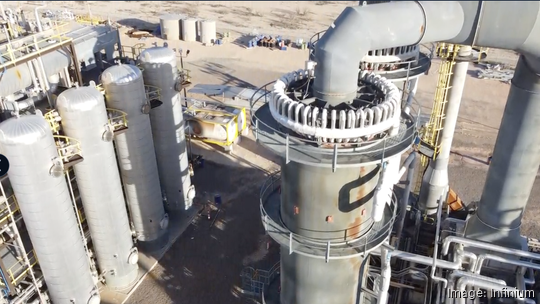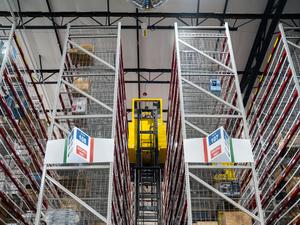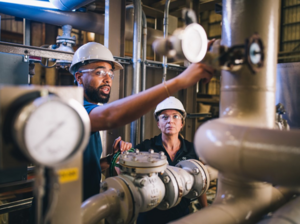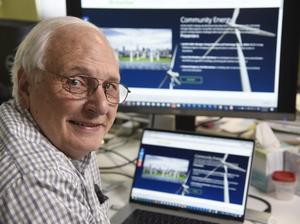
Sacramento clean fuel technology company Infinium has received a $75 million equity commitment to its Project Roadrunner energy-to-fuel manufacturing plant in Texas to produce low-carbon aviation fuel.
The equity investment in the plant by Bill Gates-founded Breakthrough Energy includes partners Citigroup Inc. (NYSE: C) and American Airlines Group Inc. (Nasdaq: AAL).
“American Airlines has made a long-term commitment to buy our fuel,” Infinium CEO Robert Schuetzle told the Business Journal. “This lines the project up for success.”
Kirkland, Washington-based Breakthrough Energy was founded by Bill Gates in 2015 to accelerate deployment of renewable energy technology to get to net-zero emissions by 2050.
Breakthrough Energy said the Roadrunner Project is the first-of-a-kind commercial-scale power-to-liquids electric-fuel facility, and is expected to be the largest in North America.
Infinium uses 100% renewable-sourced electricity along with waste carbon dioxide to make its “electrofuel,” which is a zero-carbon drop-in replacement for petroleum-sourced diesel and jet fuel.
“This project is a landmark achievement for the development of sustainable aviation fuels and the offtake agreement provides a model for the entire aviation industry on how to effect change and support the scale-up of capital-intensive projects,” said Mario Fernandez, head of the Catalyst division of Breakthrough Energy, in a news release from Breakthrough.
Project Roadrunner will convert waste carbon dioxide and renewable electric power into sustainable aviation fuel and other low-carbon fuels. In that part of Texas, there is ample excess wind-generated electricity, and the carbon comes from nearby oil industry work.
“The investment from Catalyst is critical to accelerating the completion of Project Roadrunner and to the delivery of significant volumes of e-fuels created from waste carbon dioxide and renewable power,” Schuetzle said. “This project will serve as a template for other, larger e-fuels plants under development.”
Infinium will convert an existing gas-to-liquid refinery in western Texas that had been licensing Infinium’s technology. It will change the inputs from natural gas and methane to waste carbon dioxide. Schuetzle declined to say the cost of converting the plant, but it will be more than the $75 million.
As part of the agreement, American Airlines and Infinium have agreed to a long-term firm fuel offtake agreement that will enable further investment into the project, Schuetzle said.
Another part of the agreement has American Airlines and Citi separately agreeing to transfer associated emission reduction credit to Citi to support the scaling of the technology. That will help Citi reduce its U.S. Environmental Protection Agency Scope 3 emissions related to its own employees’ travel.
Scope 3 emissions are the result of activities not owned by the reporting company, in this case, Citi, which can report reduced emissions created by the company in the process of doing its business.
Infinium says its sustainable aviation fuel has the potential to reduce the lifecycle greenhouse gas emission associated with air travel by around 90%.
The agreement, announced by American Airlines at the end of last month, is subject to the satisfaction of closing conditions.
Project Roadrunner will convert an existing brownfield gas-to-liquids project into an electric-fuel facility. It will also produce Infinium e-naphtha for use in plastics manufacturing as well as e-diesel for trucking and other cleaner fuels for maritime applications.
Schuetzle has been working on low-carbon electric-fuels for 15 years. In the early days, it was hard to get investments into the technology, but that has been changing in the past three years, he said. It’s still not easy, but it is becoming much easier to have conversations with investors. Schuetzle was in Dubai this week attending the 2023 United Nations Climate Change Conference.
In September last year, Amazon (Nasdaq: AMZN) struck an agreement to use Infinium fuel for its long-haul trucks in operation in Southern California. Before that, Infinium signed agreements to develop electrofuel plants in France, Japan and Brazoria County, Texas, which is south of Houston.
The estimated $570 million plant in France, “Project Reuze,” is a partnership with Engie SA, a French multinational utility company, to develop a commercial-scale plant that takes carbon emissions from an ArcelorMittal SA steel production plant in the port city of Dunkirk, France, for the European Union market. Luxembourg-based ArcelorMittal (NYSE: MT) is the world's second-largest steelmaker.
In November 2021, Infinium raised $69 million to commercialize its process, with lead investors including Florida-based NextEra Energy Resources LLC, the world’s largest renewable energy company, and Amazon’s Climate Pledge Fund.








